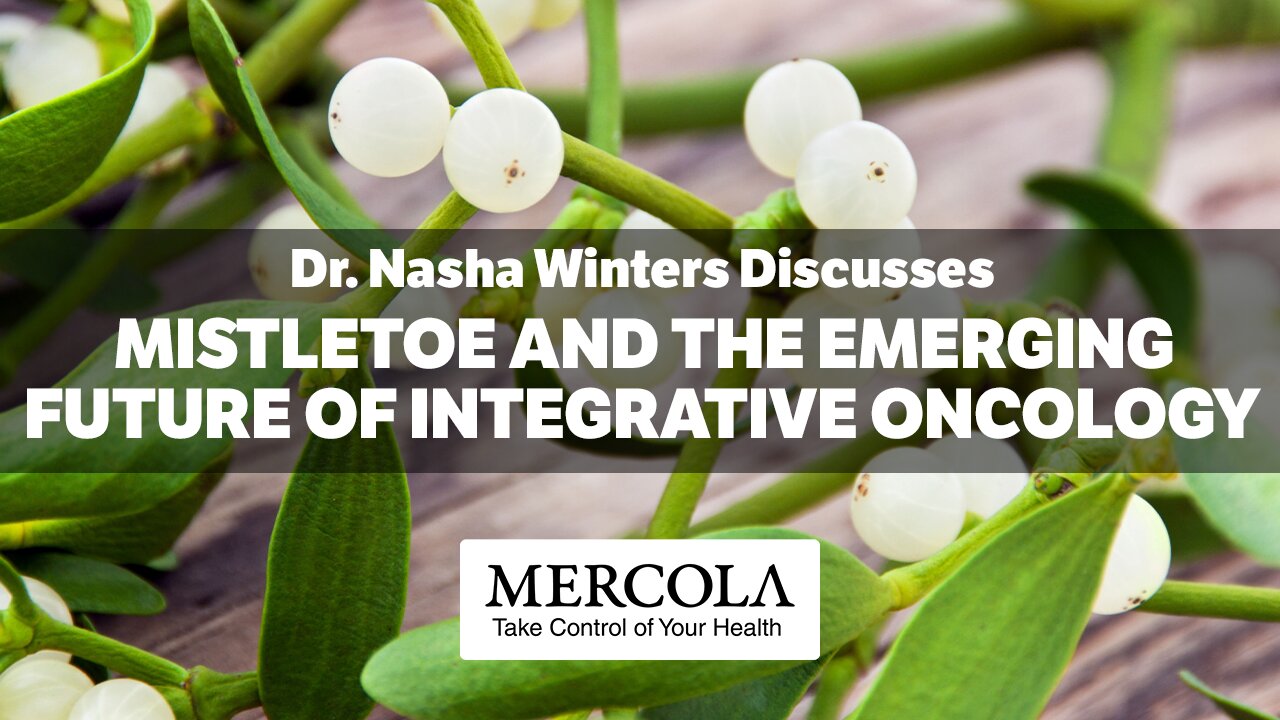Premium Only Content

Mistletoe and the Emerging Future of Integrative Oncology- Interview with Dr. Nasha Winters and Dr. Mercola
In this interview, Dr. Nasha Winters, coauthor of “Mistletoe and the Emerging Future of Integrative Oncology,” reviews some of the benefits of this ancient herb in the modern world of oncology. Winters is herself a cancer survivor, so this topic is close to her heart.
Mistletoe, a semi-parasitic plant that grows in the branches of trees all over the world, has been used in herbal medicine for thousands of years for conditions such as epilepsy, spleen disorders, pain and rheumatic conditions.
In 1917, Rudolf Steiner, a philosopher with keen observation skills, noticed that mistletoe looks a lot like a tumor, and proposed it might have anticancer properties. Dr. Ita Wegman confirmed Steiner’s suspicion, and the plant has since enjoyed over 100 years of consistent application in oncology, both standalone and as adjuvant support.
Intravenous or subcutaneous mistletoe appears beneficial as an adjunct therapy for all cancers, and there are no drug or health contraindications. Even the most toxic treatments work better and with fewer adverse effects when combined with mistletoe.
Mistletoe is the most studied integrative oncology therapy in the world, and it is utilized in upward of 60% to 80% of all cancer patients in Europe.
Your immune system and metabolic function are both integral parts of addressing cancer, and mistletoe works on both.
Article: https://bit.ly/3MS8zZT
Subscribe for the latest health news: http://bit.ly/2CEBM8j
Visit our website: http://bit.ly/2KhnpuS
Listen to our podcasts: http://bit.ly/34XeLcW
Find us on Social Media
Facebook: https://www.facebook.com/doctor.health
MeWe: https://mewe.com/p-front/dr.josephmercola
Instagram: https://www.instagram.com/drmercola
Twitter: https://twitter.com/mercola
-
 53:25
53:25
tether
11 days agoStability and Freedom in Chaos: The Story of Tether USD₮ | Tether Documentary (USDT)
76.3K5 -
 56:44
56:44
VSiNLive
1 day agoFollow the Money with Mitch Moss & Pauly Howard | Hour 1
32.3K2 -
 36:50
36:50
Anthony Pompliano
2 days ago $9.16 earnedInvestors Are ALL-IN On Bitcoin
19.5K7 -
 32:19
32:19
SB Mowing
9 days agoA Backyard She’s NEVER Seen – Now Safe for the Kids to Play!
24.7K17 -
![[Day 26] CS Blast bounty baby](https://1a-1791.com/video/fwe2/8a/s8/1/Z/H/j/_/ZHj_w.0kob-small-Day-26-CS-Blast-bounty-baby.jpg) 2:09:11
2:09:11
ggezlol_tv
6 hours ago[Day 26] CS Blast bounty baby
42K1 -
 2:32:17
2:32:17
Sgtfinesse
5 hours ago💥Sunday Morning Hunt for Featherweight Artifact | New World PVP Server: Sclavia
57K3 -
 11:25
11:25
Film Threat
21 hours agoLET'S DISCUSS THE 2025 OSCAR NOMINATIONS | Film Threat News
41.7K14 -
 13:07
13:07
DEADBUGsays
5 hours agoThe Southport Massacre, The Great British Cover-Up
36.7K22 -
 25:26
25:26
hickok45
9 hours agoSunday Shoot-a-Round # 265
31.1K27 -
 30:55
30:55
Tundra Tactical
19 hours ago $17.84 earnedFaith, Family, Gun Rights : Tundra Tactical Interviews Erich Pratt Vice President Of GOA
107K35